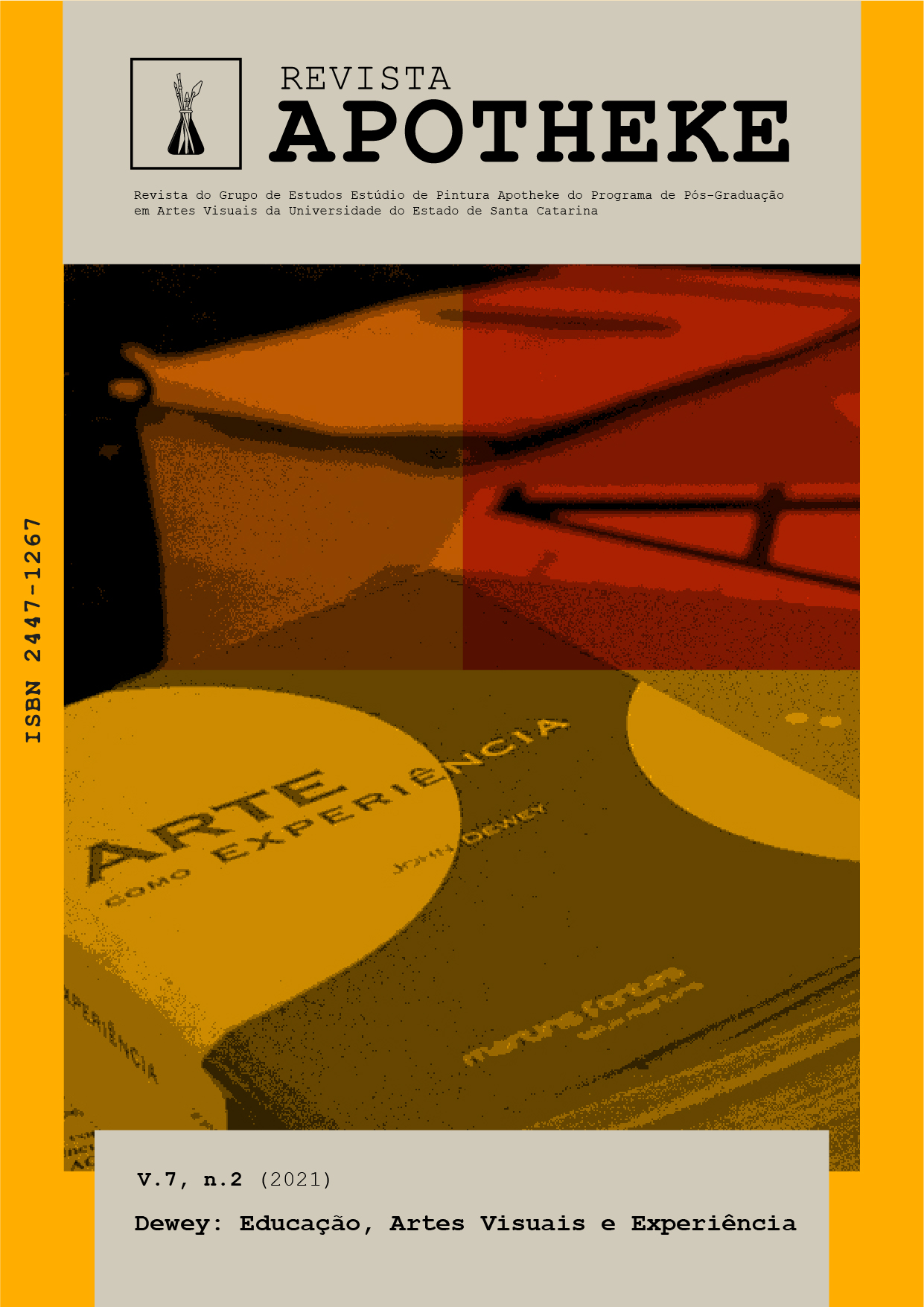Considerações sobre a aula de arte: repensando saberes e fazeres
DOI:
https://doi.org/10.5965/24471267722021354Palavras-chave:
Aula de Arte, Criatividade, Invenção, Aula Participativa, Arte EducaçãoResumo
Propomos neste artigo, refletir sobre aspectos importantes da aula de Arte em contexto educacional formal ou não-formal – nosso foco não se encontra na relação com as instituições mas com a questão epistemológica do fazer docente. Para começar propomos a diferenciação entre criatividade e invenção, aspectos políticos de ambos os conceitos e porque para nós inventar é um ato de emancipação dos sujeitos e criar, no sentido amplamente usado na educação, se configura um conceito cooptado por uma ideia mercadológica de educação. Analisamos a aula de Arte e sua relação com a ideia de arte relacional, ou participativa como preferimos. Por fim, pensamos nas contribuições que a arte pode oferecer à educação e seus modos de fazer, para isso visionamos uma educação, no sentido amplo, pelo paradigma artístico e buscamos entender os fundamentos da educação pelo paradigma científico em voga, o das ciências cognitivas.
Downloads
Referências
AGUIRRE, Imanol. Imaginando um Futuro para a Educação Artística. In: MARTINS, R.; TOURINHO, I. Educação na cultura visual: narrativas de ensino e pesquisa. Santa Maria: UFSM, p. 157-186, 2009. Disponível em: https://pt.scribd.com/document/60824348/Imaginando-um-futuro-para-a-educacao-artistica-Imanol-Aguirre . Acesso em: 07/02/2021.
ANDRÉ, Carminda M. Teatro Pós-dramático na escola. São Paulo: Editora UNESP, 2011.
BARREL, Barry. Classroom Artistry. In: The Educational Forum. n.55, p. 333-342, 1991. Disponível em: https://www.tandfonline.com/doi/abs/10.1080/00131729109335665?journalCode=utef20 Acesso em: 07/02/2021.
DE CERTEAU, Michel. A invenção do cotidiano: artes de fazer. Petrópolis: Ed. Vozes, 1998.
DELEUZE, Gilles; GUATTARI, Felix. O que é filosofia? São Paulo: Ed. 34, 1992.
DEWEY, John. Arte como experiência. São Paulo: Martins Fontes, 2010.
EISNER, Elliot. O que pode a educação aprender com as artes. In: Currículo sem Fronteiras, v.8, n.2, p.5-17, Jul/Dez 2008. Disponível em: http://www.curriculosemfronteiras.org/artigos.htm Acessado em: 07/02/2021.
FAVARETO, Celso. É isso arte? São Paulo: Entrevista ao Itaú Cultural, 1999. Disponível em: https://www.youtube.com/watch?v=-XG-71wqwUI Acessado em: 06/02/2021.
FLEITH, Denise S. Criatividade: Novos Conceitos e Ideias, Aplicabilidade à Educação. Santa Maria: Revista Educação Especial, nº 17,p. 55-61, 2001. Disponível em: https://periodicos.ufsm.br/educacaoespecial/article/view/5229 Acesso em: 05/02/2021
FOUCAULT, Michel. A verdade e as formas jurídicas. Rio de Janeiro: Nau Editora, 2002.
GIELEN, Pascal; Criatividade e outros fundamentalismos. São Paulo: Anablume, 2015.
KASTRUP, Virginia. Entre o encontro e a provocação: a ação mediadora. In: MARTINS, Mirian C; SCHULTZE, Ana M; EGAS, Olga. Mediando [con]tatos com arte e cultura. São Paulo, v.1, n.1, p.41-43, nov.2007.
MARTINS, Miriam C; DEMARCHI, Rita. Mediação cultural: entres sujeitos/corpos/experiências estéticas. In: Revista Digital Art&. São Paulo, Ano XIII, n. 17, Julho 2016. Disponível em: https://www.academia.edu/30965522/MEDIA%C3%87%C3%83O_CULTURAL_ENTRES_SUJEITOS_CORPOS_EXPERI%C3%8ANCIAS_EST%C3%89TICAS Acesso em: 07/02/2021.
MARTINS, Miriam C. (Org). Mediação: Provocações Estéticas. São Paulo, Instituto de Artes, Pós-Graduação, volume 1, número 1, p. 1 -144, outubro 2005.
______________. Arte, só na aula de arte? Educação, Porto Alegre, v. 34, n. 3, p. 311-316, set./dez. 2011.
NIETZSCHE, Friedrich. Sobre a verdade e mentira no sentido extramoral. São Paulo: Ed. Hedra, 2007.
RANCIÈRE, Jacques. O mestre ignorante: cinco lições sobre a emancipação intelectual. Belo Horizonte: Autêntica, 2010.
RENZULLI, Joseph S. A general theory for the development of creative productivity through the pursuit of ideal acts of learning. Gifted Child Quarterly, 1992.
Downloads
Publicado
Como Citar
Edição
Seção
Licença
Copyright (c) 2021 Maiquel Cristian Reichert, Carminda Mendes André

Este trabalho está licenciado sob uma licença Creative Commons Attribution-NonCommercial 4.0 International License.
Os autores de trabalhos submetidos à Revista APOTHEKE autorizam sua publicação em meio físico e eletrônico, unicamente para fins acadêmicos, podendo ser reproduzidos desde que citada a fonte. Os mesmos, atestam sua originalidade, autoria e ineditismo.
Os artigos publicados pela revista são de uso gratuito, destinados a aplicações
acadêmicas e não comerciais. Os direitos autorais são todos cedidos à revista. Os artigos cujos autores são identificados representam a expressão do ponto de vista de seus autores e não a posição oficial da Revista Apotheke. O(s) autor(es) se compromete(m) a sempre que publicar material referente ao artigo publicado na Revista Apotheke mencionar a referida publicação da seguinte forma:
"Este artigo foi publicado originalmente pela revista Apotheke em seu volume (colocar o volume), número (colocar o número) no ano de (colocar o ano) e pode ser acessado em: http://www.revistas.udesc.br/index.php/APOTHEKE/index"
É responsabilidade dos autores a obtenção da permissão por escrito para usar em seus artigos materiais protegidos pela Lei de Direitos Autorais. A revista Apotheke não é responsável por quebras de direitos autorais feitas por seus colaboradores.
Os autores mantêm os direitos autorais e concedem à revista o direito de primeira publicação, com o trabalho licenciado sob Licença Creative Commons do tipo atribuição BY-NC:
Atribuição (BY): os licenciados têm o direito de copiar, distribuir, exibir e executar a obra e fazer trabalhos derivados dela, conquanto que deem créditos devidos ao autor ou licenciador, na maneira especificada por estes.
Uso Não comercial (NC): os licenciados podem copiar, distribuir, exibir e executar a obra e fazer trabalhos derivados dela, desde que sejam para fins não comerciais.
Após a publicação dos artigos, os autores permanecem com os direitos autorais e de republicação do texto.




